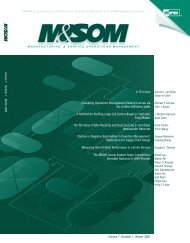Strengthening the Empirical Base of Operations Management
Strengthening the Empirical Base of Operations Management
Strengthening the Empirical Base of Operations Management
Create successful ePaper yourself
Turn your PDF publications into a flip-book with our unique Google optimized e-Paper software.
Fisher: <strong>Streng<strong>the</strong>ning</strong> <strong>the</strong> <strong>Empirical</strong> <strong>Base</strong> <strong>of</strong> <strong>Operations</strong> <strong>Management</strong><br />
370 Manufacturing & Service <strong>Operations</strong> <strong>Management</strong> 9(4), pp. 368–382, © 2007 INFORMS<br />
Figure 1 A Taxonomy <strong>of</strong> <strong>Empirical</strong> Research<br />
Interaction with <strong>the</strong> world<br />
Highly<br />
structured:<br />
Data and<br />
algorithms<br />
Less structured:<br />
Interviews and<br />
observations<br />
Prescriptive<br />
Goal <strong>of</strong> <strong>the</strong> research<br />
Descriptive<br />
than a clinical trial and <strong>the</strong>re is no immediate action<br />
prescribed by <strong>the</strong> observations <strong>of</strong> a single patient.<br />
Lab research on mice and epidemiological studies<br />
seem more structured to me, but aimed at a general<br />
understanding <strong>of</strong> a disease. It is hoped that this<br />
general understanding might eventually lead to a recommended<br />
treatment, but that is not <strong>the</strong> immediate<br />
goal. I had to think hard to come up with an entrant<br />
for <strong>the</strong> lower-left box but concluded that critical care<br />
paths qualify. These are detailed descriptions <strong>of</strong> <strong>the</strong><br />
exact procedure to be followed in a surgical procedure,<br />
including pre- and post-surgical steps. (See<br />
Wheelright and Weber1995 fora more extensive discussion<br />
<strong>of</strong> critical care paths.) As such, critical care<br />
paths are clearly prescriptive, but in <strong>the</strong> examples<br />
I have seen, <strong>the</strong> care path is determined largely by<br />
interviewing doctors and o<strong>the</strong>r health care practitioners<br />
regarding <strong>the</strong>ir opinion <strong>of</strong> best practice. Health<br />
outcomes research attempts to discover best treatment<br />
options by looking at a large sample <strong>of</strong> patients who<br />
Figure 2 <strong>Empirical</strong> Research in Medicine<br />
Interaction with <strong>the</strong> world<br />
Highly<br />
structured:<br />
Data and<br />
algorithms<br />
Less structured:<br />
Interviews and<br />
observations<br />
Goal <strong>of</strong> <strong>the</strong> research<br />
Prescriptive Descriptive<br />
Clinical trial for a<br />
new drug<br />
Critical care path<br />
Laboratory research<br />
on mice<br />
Epidemiological studies<br />
that mine population<br />
data for disease<br />
correlates<br />
Observation <strong>of</strong><br />
interesting cases<br />
Figure 3 <strong>Empirical</strong> Research in <strong>Operations</strong> <strong>Management</strong><br />
Interaction with <strong>the</strong> world<br />
Highly<br />
structured:<br />
Data and<br />
algorithms<br />
Goal <strong>of</strong> <strong>the</strong> research<br />
Prescriptive Descriptive<br />
Engineering<br />
S<strong>of</strong>tware implementation<br />
<strong>of</strong> algorithm deployed in<br />
a company and run daily<br />
Principles<br />
Less structured:<br />
Ohno invents Toyota<br />
Interviews and Production System,<br />
observations inspired by <strong>the</strong> principles<br />
<strong>of</strong> U.S. supermarkets<br />
<strong>Operations</strong> management<br />
econometrics<br />
Statistical analysis <strong>of</strong><br />
large data sets to<br />
discover drivers <strong>of</strong><br />
success in operations<br />
Case studies<br />
Interview and observe<br />
managers<br />
Research cases<br />
received different treatments for <strong>the</strong> same disease and<br />
identifying <strong>the</strong> treatment variant that correlates with<br />
<strong>the</strong> best results. To <strong>the</strong> extent that critical care paths in<br />
<strong>the</strong> future will be guided by outcomes research, <strong>the</strong>y<br />
would move toward <strong>the</strong> upper left box.<br />
Now we can think about how prior empirical<br />
research in operations management fits into this<br />
matrix. Figure 3 shows <strong>the</strong> matrix labeled with types<br />
<strong>of</strong> empirical research in operations management and<br />
with one ormore examples <strong>of</strong> each type. As one<br />
can infer from <strong>the</strong> array <strong>of</strong> activities depicted in this<br />
matrix, my own definition <strong>of</strong> empirical research is<br />
broad and includes any effort to ga<strong>the</strong>r and report<br />
information about real operations that is accurate, is<br />
intellectually deep, raises interesting research questions,<br />
and contains enough correct analysis to at least<br />
partially answer those questions. If you object that<br />
this definition <strong>of</strong> empirical research is overly broad<br />
and that only what I have called operations management<br />
econometrics deserves to be called research, feel<br />
free to think <strong>of</strong> this matrix <strong>of</strong> activities as field work. I<br />
would certainly acknowledge that some entries in <strong>the</strong><br />
matrix, such as interviews with managers, may not<br />
be a stand-alone publishable product. However, as<br />
described in §8, such activities can be extremely valuable<br />
as part <strong>of</strong> a broader program <strong>of</strong> activity involving<br />
o<strong>the</strong>rcells <strong>of</strong> <strong>the</strong> matrix.<br />
Including case studies and <strong>the</strong> implementation <strong>of</strong><br />
an algorithm in a single company in <strong>the</strong> matrix raises<br />
<strong>the</strong> question <strong>of</strong> whe<strong>the</strong>r research based on a single<br />
observation is valid. Certainly research based on a<br />
large number <strong>of</strong> observations is to be encouraged, but<br />
<strong>the</strong>re is also much to be learned from deep and exten-




